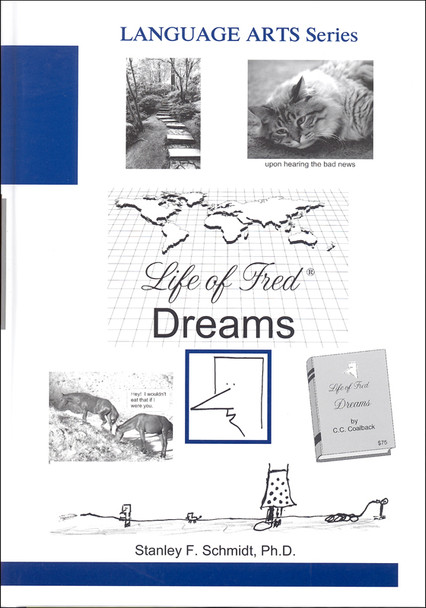Description
Grade Level: 9th - 12th
The Life of Fred Language Arts Series is designed for the high school years; it is recommended that books be used in order: Australia, Begin Teaching, Classes, and Dreams. Short and to the point, each contains 19 daily lessons that are rich in the rules of the English Language. Covering grammar (not literature and writing) as well as the many other facts about other topics Fred always integrates, these books are perfect for those who want to learn foundational English skills through the fun style of Life of Fred.
For those unfamiliar with the series, the texts follow the life of Fred Gauss - a six-year-old math professor at Kittens University who was born on the slopes of the Siberian Mountains - who has many humorous, unlikely, and zany adventures. Informal in tone and approach, these books are designed to engage students in a fun narrative while also instilling a solid understanding of concepts without an abundance of repetitive drills!
Dreams is the fourth book in the four-book series. Nineteen chapters are included. Each is designed to take one day and includes approximately four pages with a "Your Turn to Play" exercise set at the end (which consists of 3-4 questions). Answers are provided on the next page for students to go over themselves after attempting to solve the problems.
This book covers: Why kids don't go to jail, Brackets, parentheses, and braces, Three ways to make a break in a sentence (commas, parentheses and dashes), How to type an em dash on a computer, Which words ending in -nger are pronounced with a hard g, Use of [sic], Where to put the question mark(s) in Did he ask, "What time is it", What to use instead of parentheses inside of parentheses, Twenty-six research doctorates and two professional degree doctorates, Ruminants and why horses are unlucky, Three uses of a dash, When a question mark or an exclamation mark can touch a dash, What not to say to little children, Metaphors, The only time a period can touch a dash, When acronyms lose their periods or their capitalization, Analogy, Emphatic form of a verb, Compound subjects, Compound verbs, Simple, compound, and complex sentences, Coordinating and correlative conjunctions, When to express numbers as words or as numerals, Conjunctive adverbs, Figurative language (comparison, degree, and association), Two rules for making outlines, Parallel construction, Synecdoche, The difference between metaphor and metonymy, Allusions in writing, Good spelling implies high IQ, Inverse, converse, and contrapositive, Logical equivalence, The four times to use the passive voice, How to pronounce viz. e.g. and i.e., Three keys to good writing, Unnecessary prepositions, How to write an essay, Plagiarism, Etymology, Two times you can use sentence fragments, Three uses of the slash mark (/), Why we capitalize the pronoun I, Ellipsis.







